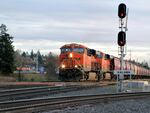
A grain ship on the Columbia River at the Port of Kalama, which could one day also host a methanol plant.
Ashley Ahearn, KUOW/EarthFix
When Tacoma residents sized up a proposal to build a methanol plant and shipping facility, they saw it mostly as a source of toxic air pollution with a mighty thirst for water and a voracious appetite for electricity.
So the Chinese-backed company behind the project said it wanted to pause the environmental review.
But that doesn't mean Northwest Innovation Works is getting out of the business of trying to produce and ship methanol in the Northwest. The company also wants to build smaller methanol production facilities at the Port of St. Helens, near Clatskanie, Oregon, and at Washington's Port of Kalama on the Columbia River.
The facilities would convert natural gas to methanol and then load it onto ships bound for China, where it would be made into plastics. The plants would be half the size of the one proposed for Tacoma.
Read: Will Methanol Be The New Aroma Of Tacoma?
Another difference: the city of Kalama is open for business and eager to host such a facility.
The proposal in Kalama is further along in the environmental review process than the St. Helens plant, and is projected to be one of the top electricity users in Cowlitz County. It would use more than 8 million gallons of water per day, which would be provided by the Port of Kalama.

Kalama has been called the place where “water, highway and rail meet,” because of its location along the Columbia River, Interstate 5, and the major Western Washington rail corridor.
Ashley Ahearn, KUOW/EarthFix
Sandwiched between Interstate 5 and the “river highway” of the Columbia, the Port of Kalama has long been known by the city’s slogan as the place where “water, highway and rail meet.” There are two grain terminals, a lumber mill, several chemical companies, a steel manufacturer, a log home manufacturer and other industries that employ roughly 900 people at the port, all told.
Oil and coal trains roll through town en route to terminals to the north in Washington and Canada. Grain arrives by train and is loaded onto ships. The Columbia River flows by serenely in the background, but the Kalama waterfront is a noisy, bustling place.
“A lot of people would look at this and say this is a crazy, chaotic, industrial site but we look at this and say, this is where Kalama came from,” said Adam Smee, city administrator of Kalama, which has a population of 2,500 people and no stop lights. “Part of our identity is heavy industry on the river. People seem to embrace that.&rdqu
![“A lot of the feedback I’ve gotten is really really positive. People are really excited [about the methanol plant],” says Adam Smee, city administrator of Kalama, Washington.](https://opb-opb-prod.cdn.arcpublishing.com/resizer/v2/AGWNTCKDTZAEBJXZXUEMXXABYQ.jpg?auth=09cad29079be1eb79cffa11dbf98b6d9f782cee02a6e0e57def0317d4e878bc2&width=150)
“A lot of the feedback I’ve gotten is really really positive. People are really excited [about the methanol plant],” says Adam Smee, city administrator of Kalama, Washington.
Ashley Ahearn, KUOW/EarthFix
Kalama mayor and port employee Pete Paulsen (who declined to be interviewed for this story) is among the city’s residents for whom all this riverside industry means local employment.
But with more and more residents of Kalama having to leave town to find work, Smee said, creating more jobs in the community is appealing.
“We don’t want to just become a bedroom community to Portland metro because you’re not really a community then, you’re just a neighborhood so yeah, we’re excited about the idea that we could have up to 240 family wage jobs,” he said.
Kalama port commissioners initially declined to be interviewed about the methanol plant but when approached at a recent public meeting, commissioner Randy Sweet said, “We think ... it has some real potential for the community but we have to get through the permitting process so we’re continuing to go through the regulatory hoops.&rdqu
![Port of Kalama Commissioners (left to right) Alan Basso, Troy Stariha and Randy Sweet at a recent meeting. “We’ve only had two people come and talk [about the methanol plant] since we started the process,” Sweet said.](https://opb-opb-prod.cdn.arcpublishing.com/resizer/v2/K6APHGIJXFBXBNI27X72BWW6BY.jpg?auth=7ec1cc18abbfe707e4d5f41d2651cc7c41c7a3bd28d7d5effdb8a696a815ddf4&width=150)
Port of Kalama Commissioners (left to right) Alan Basso, Troy Stariha and Randy Sweet at a recent meeting. “We’ve only had two people come and talk [about the methanol plant] since we started the process,” Sweet said.
Ashley Ahearn, KUOW/EarthFix
When asked about the recent pause in the permitting process for the plant in Tacoma, fellow port commissioner Alan Basso shrugged and said "That's Tacoma. I can't comment on what's going on in Tacoma. We live down here and work down here. What happens up there I guess happens up there but we're still planning to proceed with our project."
The draft environmental impact statement will be released in the next few weeks and then the public will have the opportunity to weigh in on the project.
Port commissioners aren't expecting to hear much from the local citizenry.
"We've only had two people come and talk since we started the process. Even in the scoping process what did we have 18 comments?" Sweet turned to his fellow commissioners for confirmation. "It was minor compared with what's going on with the coal facilities and others that are getting all the headlines."
Kalama may be hoping to stay out of the headlines out of concern that environmental groups and local residents will take aim at the proposed plant, as they have at the larger methanol project proposed in Tacoma.